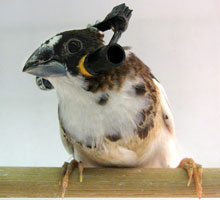
Scientists studying how songbirds stay on key have developed a statistical explanation for why some things are harder for the brain to learn than others.
"We've built the first mathematical model that uses a bird's previous sensorimotor experience to predict its ability to learn," says Emory biologist Samuel Sober. "We hope it will help us understand the math of learning in other species, including humans."
Sober conducted the research with physiologist Michael Brainard of the University of California, San Francisco.
Their results, showing that adult birds correct small errors in their songs more rapidly and robustly than large errors, were published in the Proceedings of the National Academy of Sciences (PNAS).
Sober's lab uses Bengalese finches as a model for researching the mechanisms of how the brain learns to correct vocal mistakes.
Just like humans, baby birds learn to vocalize by listening to adults. Days after hatching, Bengalese finches start imitating the sounds of adults. "At first, their song is extremely variable and disorganized," Sober says. "It's baby talk, basically."
